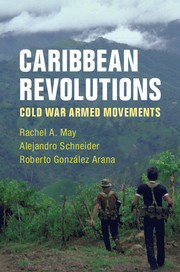
- Cited by 6
-
Cited byCrossref Citations
This Book has been cited by the following publications. This list is generated based on data provided by Crossref.
Agudelo Taborda, Jairo and Riccardi, Davide 2019. La cooperación internacional para la paz en Colombia: los casos de Estados Unidos y de la Unión Europea (1998-2016).. Geopolítica(s). Revista de estudios sobre espacio y poder, Vol. 10, Issue. 1, p. 107.
2022. A History of Modern Latin America. p. 369.
Shaffer, Kirwin 2022. A Transnational History of the Modern Caribbean. p. 153.
Kruijt, Dirk 2024. Interviews with guerrilla leaders and military commanders in Latin America, 1959 to the 2000s. Journal of Postcolonial Writing, Vol. 60, Issue. 4, p. 465.
2025. Coups d'État in Cold War Latin America, 1964–1982. p. 233.
Abraham, Jenaro Carlston, Kelsey and Bondanella Taninchev, Stacy 2025. Choking off democratic channels and the resort to violence: how the political genocide of Unión Patriótica (UP) candidates escalated and perpetuated Colombia’s armed conflict . Small Wars & Insurgencies, Vol. 36, Issue. 1, p. 185.
- Publisher:
- Cambridge University Press
- Online publication date:
- June 2018
- Print publication year:
- 2018
- Online ISBN:
- 9781108344081


